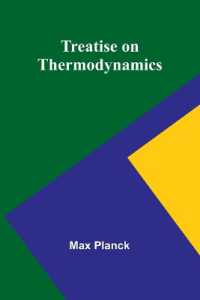- ホーム
- > 洋書
- > 英文書
- > Politics / International Relations
Full Description
The 2016 presidential election was unconventional in many ways. The election of President Donald Trump caught many by surprise, with a true outsider — a candidate with no previous governmental experience and mixed support from his own party — won the election by winning in traditionally Democratic states with coattails that extended to Republican Senate candidates and resulted in unified Republican government for the first time since 2008. This result broke with the pre-election conventional wisdom, which expected Hillary Clinton to win the presidency and a closer Senate divide. This surprising result led many political scientists to question whether 2016 truly marked a major turning point in American elections as portrayed in the media — a break from the conventional wisdom - or whether it was really the exception that proved the rule.
In this volume, political scientists examine previous theories and trends in light of the 2016 election to determine the extent to which 2016 was a break from previous theories. While in some areas it seems as though 2016 was really just what would have been predicted, in others, this election and the new president pose significant challenges to mainstream theories in political science. In particular, prominent political scientists examine whether voter trends, with particular focus on groups by gender, age, geography, and ethnicity, and election issues, especially the role of the Supreme Court, followed or bucked recent trends. Several political scientists examine the unconventional nomination process and whether this signals a new era for political parties. The role of conspiracy theories and voter confidence in the administration of elections are also discussed. Finally, contributors also examine the indirect effect the presidential candidates, especially Trump, played in congressional election rhetoric.
Contents
Introduction
Jennifer Lucas, Christopher Galdieri, and Tauna Sisco
Section 1: Voting Demographics: Did Voter Trends Follow the Conventional Wisdom?
Chapter 1: Targeting the Vote: Constituency Appeals and Group Voting in the 2016 Presidential Election
Richard J. Powell and Mark D. Brewer
Chapter 2: And the Wall Came Tumbling Down: The Political Geography of the 2016 Presidential Election
Chad Kinsella
Chapter 3: "The Supreme Court: It's What it's all About"... or is it?: Analyzing the Court Issue in the 2016 Presidential Election
Kevin McMahon
Chapter 4: The Latino Vote in the 2016 Election—Myths and Realities about the "Trump Effect"
Atiya Stokes-Brown
Chapter 5: Age and Gender Intersectionality in the 2016 Presidential Election
Elizabeth Hahn Rickenbach and Elizabeth P. Ossoff
Chapter 6: Contempt and Anger in the 2016 Election
Kyle Mattes, Ira Roseman, David P. Redlawsk, and Steven Katz
Section 2: Political Parties: Did 2016 Undermine the Conventional Wisdom on the Influence of Parties in Elections?
Chapter 7: Endorsements in the 2016 Invisible Primary: Still a Useful Indicator?
Jack D. Collens and Emily O. Wanless
Chapter 8: Intraparty Democracy and the 2016 Election
Julia Azari and Seth Masket
Chapter 9: Conspiracy Theories in the 2016 Election: Costly Signals or Conventional Wisdom
Matthew Atkinson, Darin DeWitt, and Joseph Uscinski
Section 3: 2016 Congressional Races: What Impact did Trump have on Congressional Races in 2016?
Chapter 10: Experienced Legislator or Career Politician? Outsider Rhetoric in the 2016 Election
Christopher Chapp, Dan Hofrenning, Tyler Benning, and Aidan Zielske
Chapter 11: The Trump Effect and Gender Norms in the 2016 Senate Elections
Robert G. Boatright, Valerie Sperling, and Sean Tatar
Section 4: Election Administration: Did Election Administration Improve in 2016?
Chapter 12: Election Administration in 2016
Charles Stewart III and Terri Susan Fine








